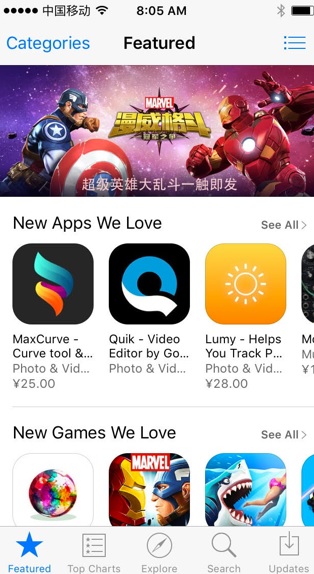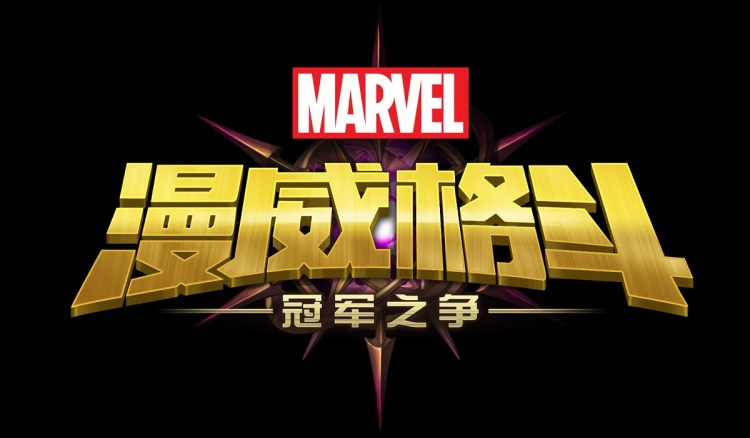More than a year ago, San Francisco-based Kabam announced that it had teamed up with China’s Longtu Games to publish a Marvel mobile game in China. Today, Kabam has a No. 1 hit in the Chinese iOS mobile game market, but it accomplished it by self-publishing the title.

Above: Kabam’s Marvel mobile game was highlighted in the App Store in China.
Kabam’s free-to-play Marvel: Contest of Champions has generated well over $100 million in the West to date, and the company was eager to take it to China. On iOS, it self-published the title as Man Wei Ge Dou: Guan Jun Zhi Zheng (漫威格斗:冠军之争). It was a very different title, fully customized for Chinese tastes. The game quickly hit No. 1 in the download charts and has dropped off since in China, with more than 2 million downloads to date. How that happened is an instructive lesson for Western game companies who want to succeed in China, which has the largest mobile game market in the world with $7.1 billion in revenue.
Kent Wakeford, the chief operating officer of Kabam, said in an exclusive interview with GamesBeat that the company initially partnered with Longtu to make the game. But as the two companies progressed, they decided to part ways. Wakeford said the split was amicable, and he said Kabam realized that, with its staff of 200 people in Beijing, it had the chops to go it alone.

Above: Kabam’s Marvel game hit No. 1 on iOS in the top downloads.
With a team of about 35 of those staffers, Kabam set about customizing the game. The process started about 18 months ago, and it finally finished about three months ago. The game launched last month. Man Wei Ge Dou: Guan Jun Zhi Zheng launched with a large file size, which is relatively rare in China. But Kabam saw that the opportunity on Apple devices, where file sizes could be larger, could enable a big game and a big investment.
In China, it’s OK to create “pay to win” free-to-play games, where players who spend a lot of money can gain VIP advantages over those who don’t.
“We had to redesign the game so that it catered to the VIPs,” Wakeford said. “In Western markets, the game is more balanced. People can either pay or invest their time and achieve the same things. In China, we redesigned the game to cater to the VIPs. The reward they get with the unlocks are very important for the gameplay.”
In the West, fans of the Marvel game tend to collect their favorite characters, who also happen to be the most famous. In China, the behavior is different. The players often opt for the characters who have certain kinds of skills for fighting, regardless of whether the characters are famous or not.
“That was a big difference for us, and we had to lean into that,” Wakeford said. “It was something that we hadn’t anticipated.”
Progression through the different levels was also different. There’s a feature dubbed “auto-fight,” where you could skip the fight and then move on to the loot grinding and the meta game. That auto-fight feature resonated with the Chinese.
There were a lot of challenges in building out the technical infrastructure, which was larger than most Chinese titles.
“You have to make sure you build your deployment solution and hosting in a way that works for China,” Wakeford said. “That was harder than we thought. Regulatory permission is also harder, as we went to two different regulatory agencies to get permission in China. It takes longer.”
Translation was also tough. Rather than just translating text, you have to make the text fit the local market, he said.
“You have to understand what the fans love about the game and what appeals to them,” Wakeford said.
Disney, which owns Marvel, helped with the marketing. It highlighted the game at big malls in China where Captain America: Civil War debuted. It also promoted Man Wei Ge Dou: Guan Jun Zhi Zheng on the Disney and Marvel Weibo and WeChat mobile messaging networks in China — which are great for social word-of-mouth.
“Disney was supportive of the launch and continues to be a great partner for Kabam in China,” Wakeford said. “We found the power of WeChat is incredible in China. Games can burst up the charts. But the power of social marketing in China is very strong.”
There’s still work to do. One observer noted that the App Annie market research data shows that the game’s downloads and revenue have dropped off. Kabam says that on a global basis, the Marvel game is profitable. In China, the game is about breakeven.
Kabam hasn’t launched the game on Android, and Wakeford believes the company will need a partner in China for that. Wakeford said that the parting with Longtu was “amicable” and that the two companies continue to have a good relationship.
Still, Wakeford acknowledged that is very challenging for Western companies to work out partnerships in China. It is complicated, and it takes a lot of investment in face-to-face relationship building.
“For us, parting ways with Longtu had to do with the strategic talks about the long-term goals of the game,” Wakeford said. “We want our games to last for years and years. For us, when we were thinking about being in China for the long term, investing in gameplay and marketing made sense. We sensed a different perspective working with a different third-party. The view of the future didn’t necessarily align with ours. To truly meet our goals in China, we had to seize control of our own destiny. We now have the infrastructure to double down in China.”
Wakeford believes Kabam can repeat this success with future games. Kabam reduced the size of its Beijing office by spinning off a team that operated legacy games to Chinese game publisher Gaea Mobile. And Kabam still has a separate team in Beijing working on an original game with Kabam’s own intellectual property. Overall, Kabam still has more than 700 employees.
“We have the infrastructure and internal data tunnels set up,” he said. “We have the marketing infrastructure set up, the customer support system, and we have now tested the devices and operating systems and worked through all of the quality assurance and certification issues in China. We now have the infrastructure to bring a lot more product into China.”

Above: Kent Wakeford, the chief operating officer of Kabam, at GamesBeat Summit.
VentureBeat's mission is to be a digital town square for technical decision-makers to gain knowledge about transformative enterprise technology and transact. Learn More

